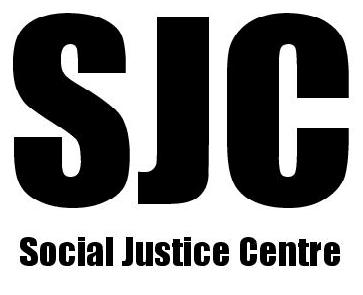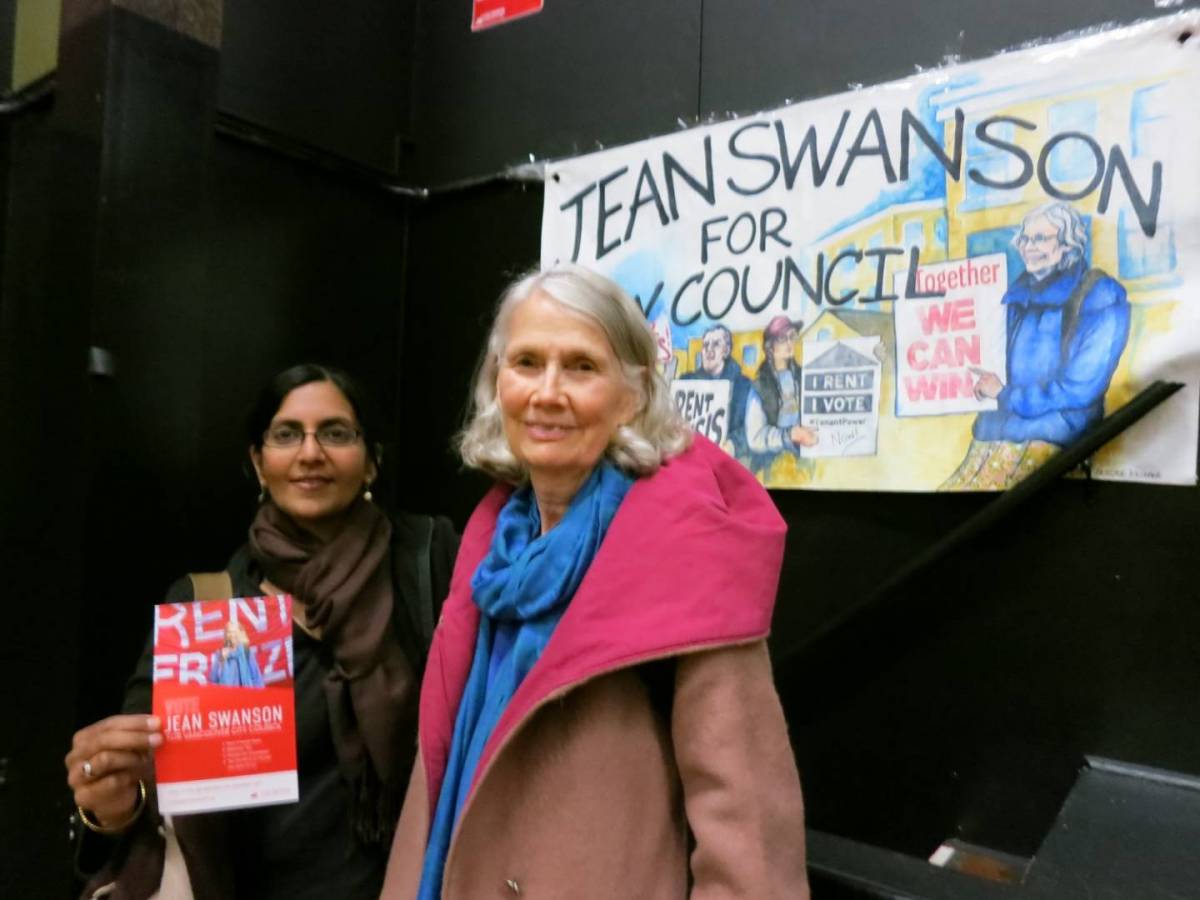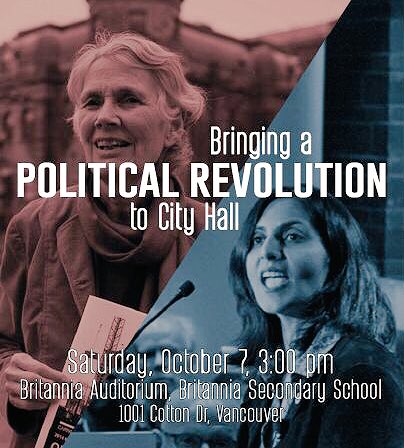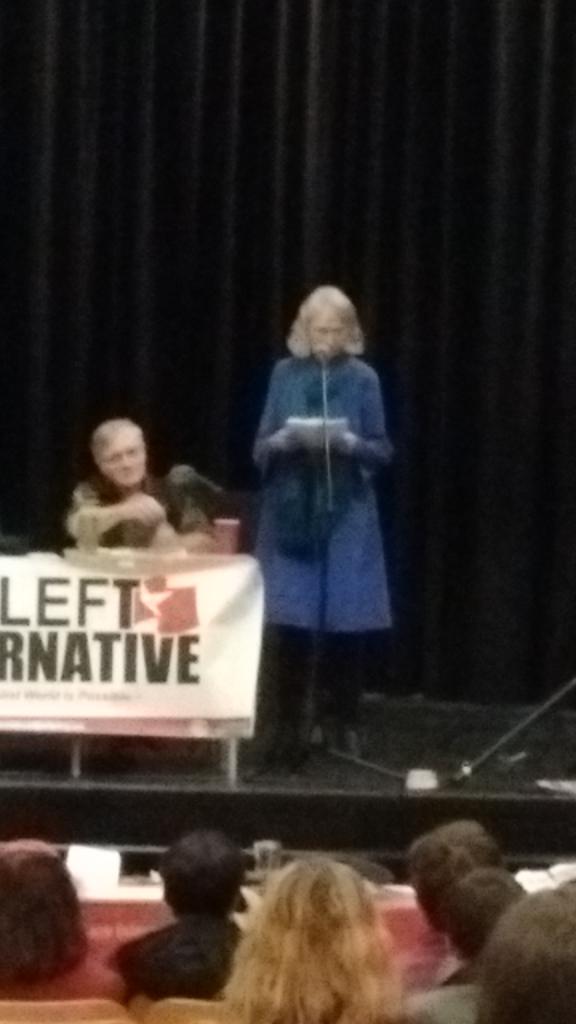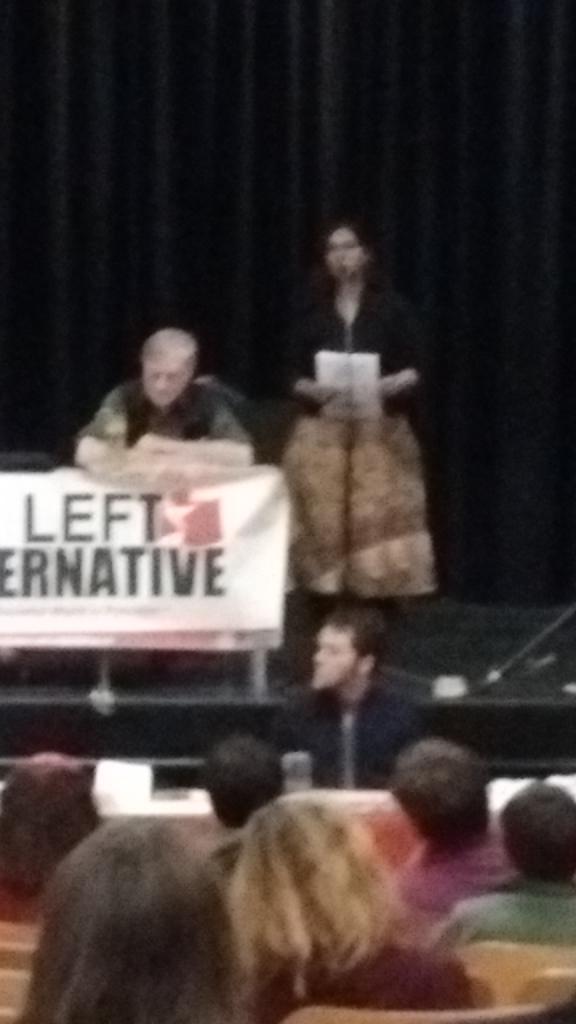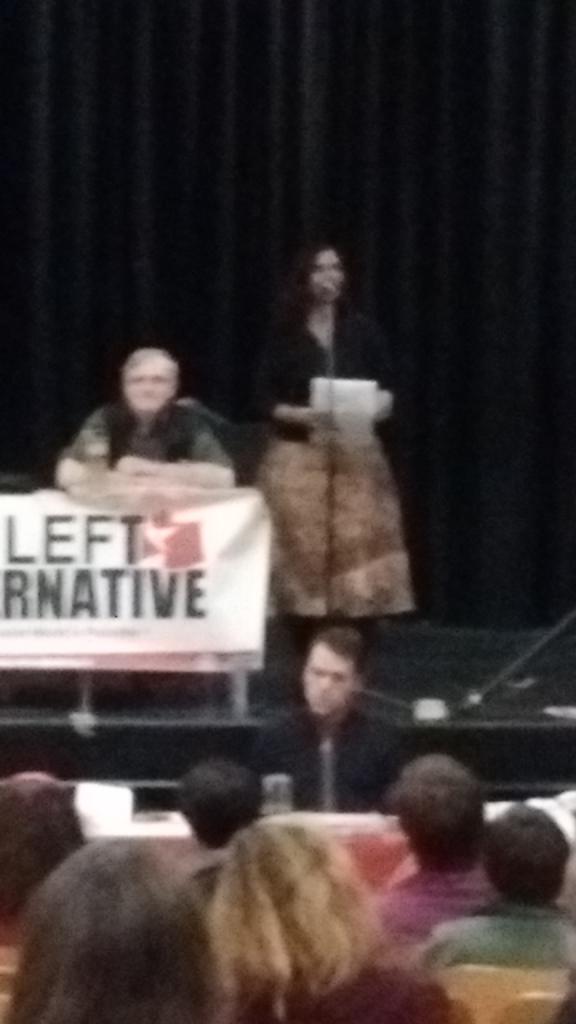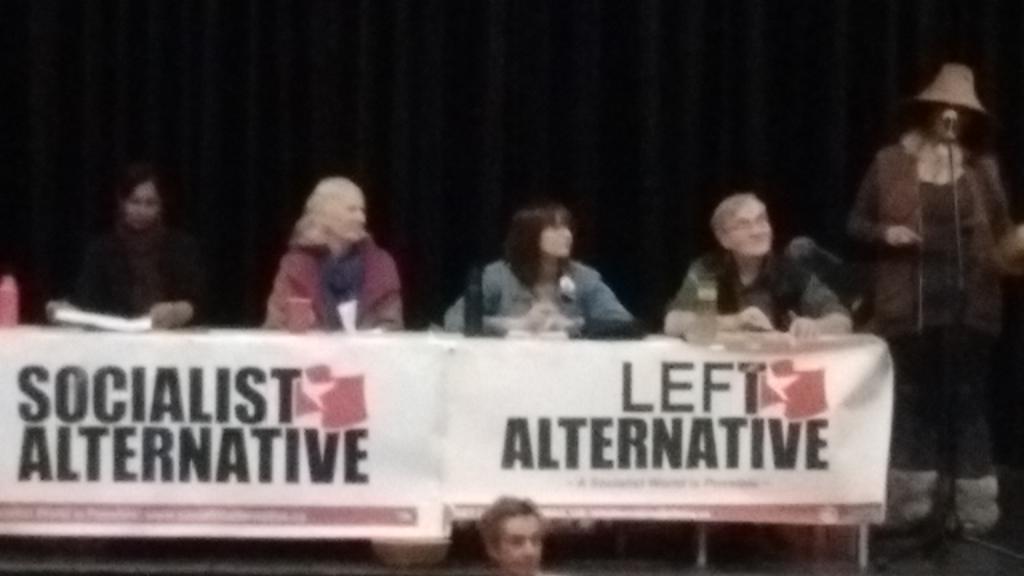Hosted by Socialist Alternative and Left Alternative. Britannia Secondary School. October 7, 2017.
By Jeff Shantz
Some on the Left have been excited recently by the perceived successes of socialist political candidates, such as Bernie Sanders in the US and Jeremy Corbyn in the UK. In Vancouver a constellation of activists has come together to support the campaign for city councillor or respected grassroots activist Jean Swanson. Swanson’s campaign draws inspiration from the successful election and re-election of Socialist Alternative member Kshama Sawant to city council in Seattle in 2013 and 2015. On Saturday, October 7, 2017, Swanson and Sawant spoke on the prospects for a socialist municipalism at a fundraising event for the Swanson campaign. My report on the event follows.
The event began with Jane Buckshon of Left Alternative, a student socialist group at Simon Fraser University which supported food service workers at SFU in their jobs battle. One hundred and seventy food service workers were at risk of losing their jobs because the food service company and contract at SFU changed. It was a successful campaign.
Buckshon said that some youth are drawn to the Swanson campaign because it is addressing real concerns with real solutions. She noted the high costs of housing and tuition for students who have classroom demands that cut into work and well being. And leave young workers with huge debt loads. There are real impacts on mental health for students. Those problems are not inevitable, however. But to change, systems need to change. For Left Alternative the Swanson campaign is connected to broader mass movements.
The next speaker was Kshama Sawant, the clear draw for the event and the one many were there to hear. Sawant has drawn international attention as the first socialist councillor in Seattle in over 100 years. She is active in movements and has not accepted corporate money. Her council work has included being part of a successful push for $15/hour in Seattle, divestment from Wells Fargo, and money for social housing. In 2015, with Indigenous activists, they eliminated Columbus Day.
Sawant opened by saying this is not the age of Trump as some suppose and fret. Rather it is the age of social movements. Resistance is also rising globally. Sawant suggests that most in the US are moving Left. They are disgusted with corporate politicians and looking for alternatives. She suggests that the Right has been emboldened by Trump but most workers do not support what he stands for.
Sawant then turned her attention to the context in Seattle which she says is dominated by the Democratic Party establishment. The Seattle Process emphasizes politicians building back room consensus. They speak progressive but govern neoliberal. And the city is marked by massive wealth, vulnerability for most working people, many people priced out, and high rates of homelessness. Like Vancouver on all counts.
Sawant says her campaign came out of Occupy in Seattle. It openly proclaimed support for the working class and opposition to developers. It was a campaign for the oppressed and marginalized. They openly stated their socialism. Sawant says in response people were energized and many had been waiting for such a campaign. She noted that many do not vote because they see no meaningful alternative.
For Sawant, there are only two sides in politics. Those who own and control and those who do not. You have to be clear which side you are on. She is clear you have to continue to fight against developers, speculators, and corporations. Even supposedly progressive councillors have bought into the “consensus” model. That means concessions to developer candidates. It means capitaulation too often.
Sawant insists that the real need is for social movements. Politicians are not enough. After her election two mainstream councillors told her the donors ran the council and she should forget her call for $15/hr. She notes that her campaign used tactics like the threat of ballot initiatives to win $15. She says the Chamber of Commerce confirmed the part that tactic played. Corporate politicians only fear the movement, not the progressive politician who can otherwise be marginalized.
In 2016 the movement won a campaign against a $160 million new police headquarters in Seattle. The Bunker would have been the largest police headquarters in the US and an offensive expenditure of public resources given real social needs in the city. The campaign to Block the Bunker even won $29 million for affordable housing instead.
Sawant ended by making the point that working people need solid organizations. There needs to be a collective resource in organization.
Finally, the event wrapped with the campaign presentation from long time anti-poverty activist Jean Swanson. Swanson noted that the richest eight men own as much wealth as 3.6 billion people. And the great wealth disparities are repeated in Vancouver. She noted that Chip Wilson of Lululemon infamy (and KPU donor) contributes more than $37000 to neoliberal Vision Vancouver, which dominates Vancouver municipal politics now. She pointed out absurd situations where property owners can vote twice while tenants are often left off rolls because they move frequently (forced by evictions, demovictions, renovictions, criminalization, etc.).
Swanson proposals like a mansion tax and rent freeze have become part of the election debate through her campaign. And we actually need a rent reduction. She suggests that $174 million per year could be raised through the mansion tax and she is proposing only modest numbers like one percent for houses over five million and two percent over 10 million. I would go for more myself. Swanson would also make public land available to Indigenous communities for housing. Swanson also spoke of the need to address the opioid crisis by making drugs free and clean.
Notably, Swanson pointed out that police, libraries, and parks are excluded from Vancouver’s Sanctuary City. She would work so police cannot report people to Border Services. She suggested the need for free transit for downtown workers. And rightly said we could cut transit police to pay for it.
Swanson also emphasized the need to stop police harassment of homeless people. Most impressively, and necessary, she would work to cut police budgets. Police eat up the largest portion of municipal budgets year after year and take needed resources that should be better spent on health care, harm reduction, social supports (instead of turning these into police functions—in repressive forms).
I remain skeptical of campaigns for political office and the resources they demand from movements, But I do have to say that a movement-based member of council with someone who knows intimately the social violence and public wastefulness of police institutions and would work to reduce or cut their budgets, reign in their actions, and cut their size and scope could have some positive possibilities.
